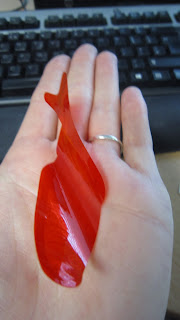Around this time last year, Ruth helped deliver a training
day on collection care basics. It was held in London and the teaching was
shared with a Preventive Conservator colleague from the British Library, where
the course was held. Earlier this month Ruth was back at the British Library to
provide this ‘Essential Preservation’ training day to a fresh group of
attendees….but how were one of the nation’s favourite TV shows and a Christmas
cracker toy involved?
Last year’s ‘Essential Preservation’ training session had
been a great success – library and archive professionals who were interested in
learning more about the steps they might take to care for their collections spent
the day looking at a range of issues from best practice handling to writing
preservation policies. The feedback was good but I felt that some improvements
could be made to make it even better!
The day was split up into six sessions: an introduction
setting out terminology and referencing the relevant standards and then
lectures on handling, storage, writing a preservation policy, risk management
and disaster response, and finally communicating the conservation message and
where collaborations and sources of help can be found. I was responsible for
three of the sessions – handling, storage and policy writing.
There’s so much important information to pass on that it was
difficult of think of any other way to convey it other than in a lecture format.
But the first time I ran the sessions I felt that the PowerPoints I had
produced were a bit text heavy and would benefit from some more pictures to
illustrate my points, and that there needed to be a bit more participation from
those attending to make it more engaging for them.
The handling session already had a strong practical element
in the shape of demonstrations and the opportunity for delegates to have a go at
applying best practice techniques themselves; and in the policy session I had a
short practical exercise to start everyone thinking about what their own
preservation policy might contain. So I concentrated on how to improve the
storage session...
I also wanted to introduce an exercise for the delegates so
they had a chance to put the principles I covered into practice. With the
help of a colleague who used to work for the National Trust for Scotland, we
created graphs showing temperature and relative humidity over the course of one
day for three fictional spaces – a conservation studio, a store built to the
sector standard, PD5454:2012, and a room in a historic house. The delegates had
to work out which graph related to which space and then discuss the conditions
shown in the graph – were they suitable for collections, and were there any
measures they would introduce to improve conditions? The exercise seemed to
work really well, it certainly got everyone talking about collection care
issues, and I think we could have expanded on this a bit more if it hadn’t then
been lunchtime!
I promised fortune telling fish… well, everyone got one
when I was describing the potential issues around relative humidity as an
example of how warmth and moisture in the air (or in this case from your hand)
can impact on materials in your collection.
According to the fish, I’m fickle!

No comments:
Post a Comment